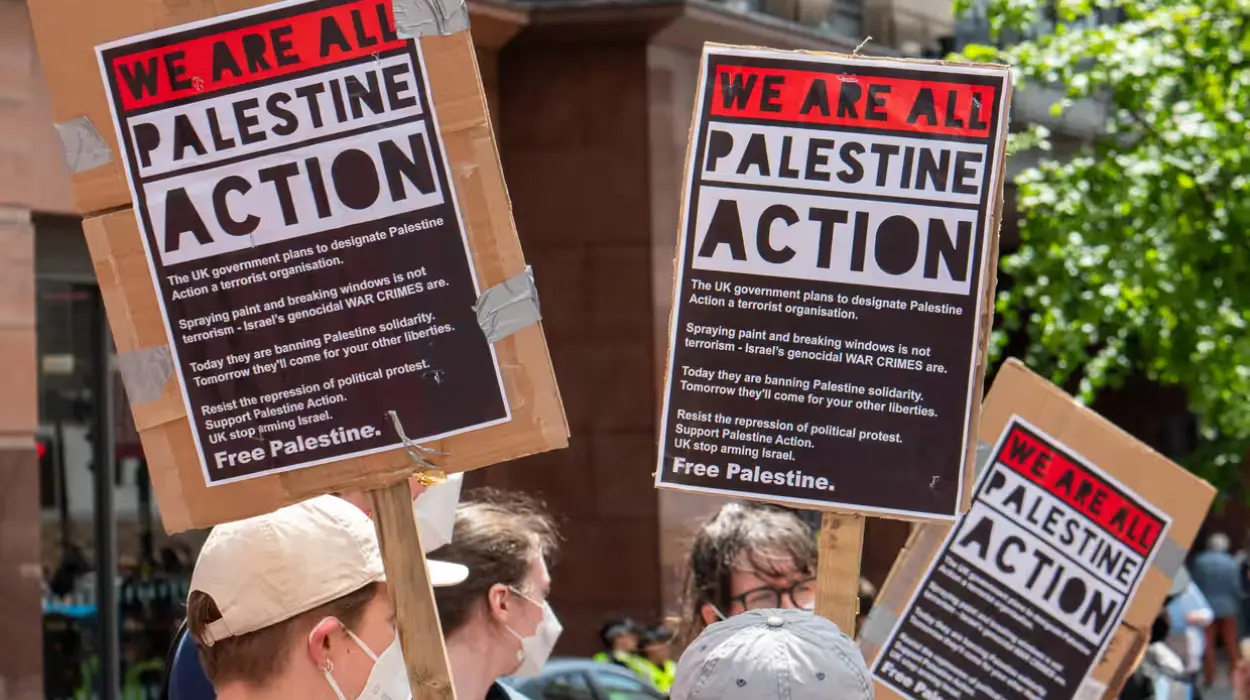UK (Parliament Politics Magazine) – A judge granted Palestine Action an urgent court hearing to challenge its terror ban, amid warnings it could threaten protest rights in the UK.
As reported by The Guardian, an urgent High Court hearing will be held on Friday after Palestine Action challenged a banning order intended to outlaw the direct action group.
Home Secretary Yvette Cooper last week proposed placing Palestine Action in the same category as al-Qaida, Islamic State, and National Action. Protest groups, civil liberties bodies, and several politicians have criticised the move.
On Monday, an order will be presented to Parliament to proscribe Palestine Action under terrorism legislation. The decision would criminalise association with or support for the group, punishable by up to 14 years in prison.
What role will the courts play in the terror order?
During a last-minute High Court session on Monday, it emerged that Palestine Action co-founder Huda Ammori will be allowed to seek “interim relief” against the proposed proscription order.
According to David Blundell KC, representing the Home Office, the government intended for the ban order to be discussed in Parliament this week. He said it was scheduled to be signed on Friday and enforced from Saturday.
The judge, Mr Justice Chamberlain, said if the court grants interim relief to Palestine Action on Friday, the order’s activation would be put on hold. Another hearing is set for 21 July, where Huda Ammori will request to pursue a judicial review to nullify the proscription order.
What did Huda Ammori say about the terror label?
Huda Ammori said, “The court’s decision to grant an urgent hearing this week is indicative of the vital importance of what is at stake in this case, including the far-reaching implications any proscription of Palestine Action would have on fundamental freedoms of speech, expression and assembly in Britain.”
She stated, “This is the first attempt in British history to criminalise direct action, political protest, as terrorism, mimicking many authoritarian regimes around the world who have used counter-terrorism to crush dissent. This would set an extremely dangerous precedent, with repressive impacts right across the Palestine movement.”
Ms Ammori added, “Spraying red paint on war planes is not terrorism. Causing disruption to the UK-based arms factories used by Israel’s largest weapons firm, Elbit Systems, is not terrorism.”
Her lawyers argued, “there has been a failure of the duty to inform the claimant of the basis on which it is proposed to restrict her rights through proscription” and to “afford her the opportunity to make representations before any decision to restrict her rights.”
What did the submission say about the ignored voices?
According to the submission, while “extensive consultation has taken place with the Israeli government and arms companies … no opportunity has been provided for other groups affected or concerned by the proposal to proscribe Palestine Action, including Liberty, Amnesty International and other civil society organisations.”
What did rights groups say about the terror measures?
According to Palestine Action, Liberty, Amnesty International, and the European Legal Support Centre filed witness statements in support of Ammori.
They argue that counter-terrorism powers are being unlawfully applied to suppress protest.
Palestine Action claims it uses civil resistance to stop what it views as unlawful actions against the Palestinian people.
What reason did Yvette Cooper give for the ban?
Yvette Cooper ordered the ban under terrorism laws after Palestine Action targeted military aircraft at RAF Brize Norton in Oxfordshire. Authorities confirmed that five people were arrested over the action.
The home secretary said there had been “a long history of unacceptable criminal damage committed by Palestine Action.”
Key facts about Palestine Action
- Founded in 2020, the group targets arms firms like Elbit Systems.
- Damages total millions, including £1M in Glasgow (2022) and Bristol (2024).
- Legal action: 50+ activists tried for damage and burglary; outcomes vary.
- The UK may label the group a terrorist organisation, with up to 14 years for members or supporters.


